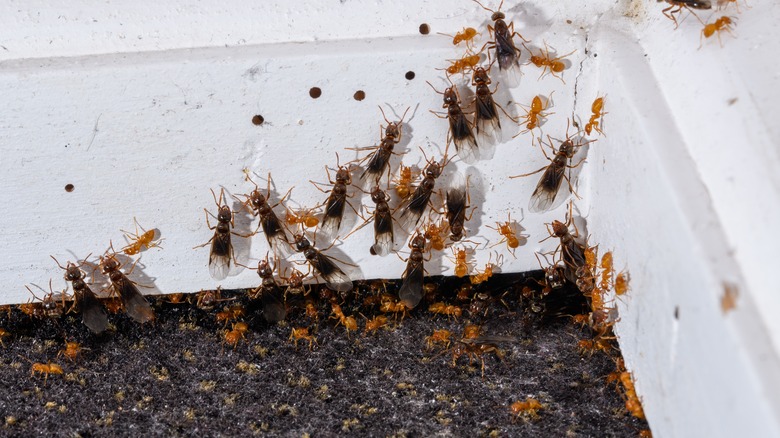The Easiest Way To Banish Pesky Flying Ants From Your Home
Imagine the horror of discovering that a rogue army of black or brown airborne intruders has taken over your house. No, it's not a scene from a sci-fi flick, but a reality many homeowners face — the onslaught of flying ants. So, why do you suddenly have flying ants in your house? Well, these creatures constantly seek sustenance and moisture, which could, unfortunately, mean turning your home into their feasting ground. Fortunately, there's a surprisingly effective, non-toxic weapon of destruction: essential oils. Spray a formula of essential oils and water in well-trafficked fly ant areas, and you could have just landed yourself the golden ticket to evicting those bothersome colonizers.
But wait, are you sure those are flying ants and not winged termites? Their similarities might confuse you initially, but fortunately, several unique characteristics swoop in to save the day. Flying ants boast slender waists, complemented by bent antennas and two sets of different-sized wings. In stark difference, winged termites have uniform body thickness, shorter and straighter antennas, and grander, uniformly-sized wings. Identifying your enemy's strongholds is half the battle won. In the case of flying ants, the hunt stretches from your bathrooms, basement, and kitchen to decomposing wood, damp spots, and even under the sink.
How to get rid of flying ants naturally
Essential oils like peppermint, clove, and citrus could be your saving grace in getting rid of flying ants. However, each variety presents a unique approach. Clove oil is a double threat as a toxic agent and a formidable deterrent, thanks to its bug-squashing agent, eugenol. Citrus oil joins the battle as a toxin, armed with a lemony constituent known as d-limonene. Meanwhile, cedarwood, peppermint, or tea tree essential oil's potent scent doubles down as a repellent.
Now, onto the actual showdown against flying ants. Concoct 16 ounces of water and ten drops of an essential oil in a spray bottle. You can also combine different essential oil varieties for added potency. Next, shake the bottle to blend the ingredients, then liberally spray the mixture onto the ant-occupied territories. That includes the trails and points of origin. However, total control might take a few rounds of treatment.
Beware that essential oils can harm cats when inhaled, ingested, or via skin contact, per Cats Protection. Peppermint, citrus, and tea tree oils are also toxic to dogs as well, per Cabbagetown Pet Clinic. Whether you're a pet parent or not, remember different oil types carry unique smells so ensure you find the balance that suits you and other occupants. As always, prevention reigns supreme. Speedy cleanups of food messes, using airtight containers for food storage, and fixing potential ant entrance points like cracks are among your best defenses against an ant takeover in your home.

